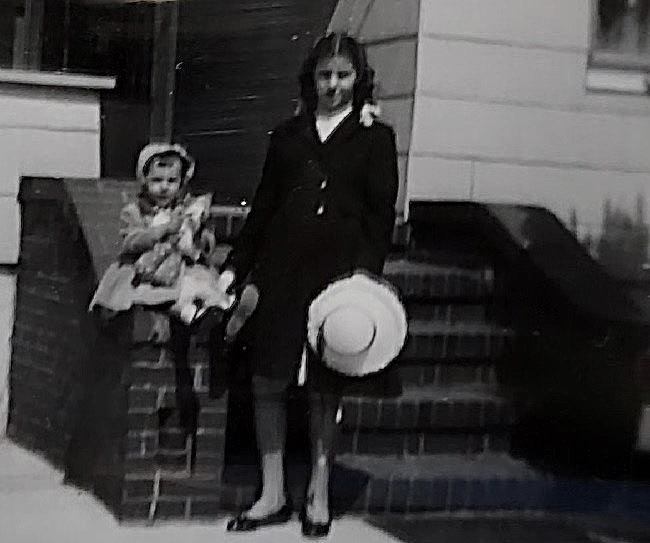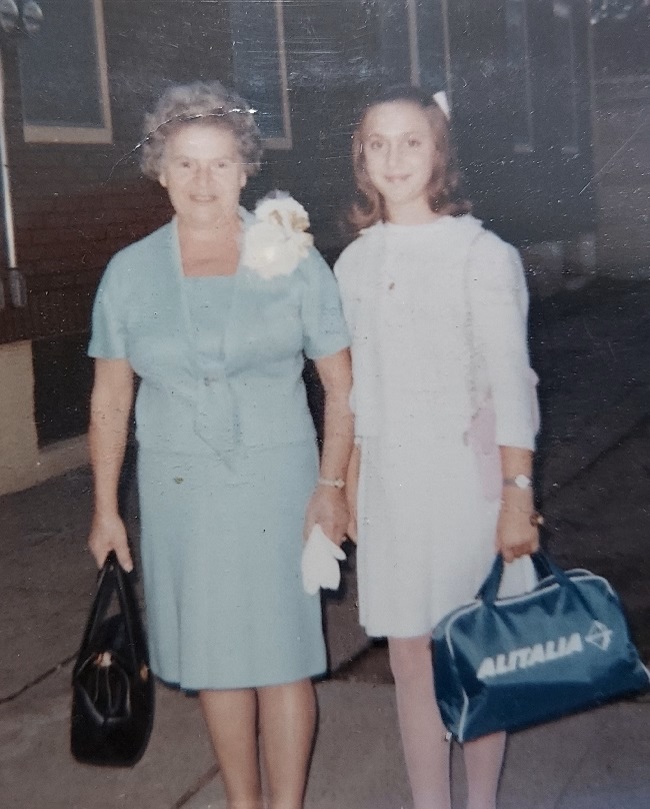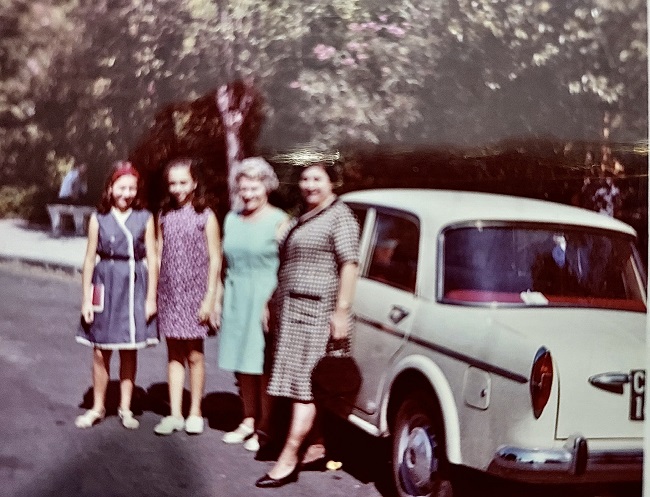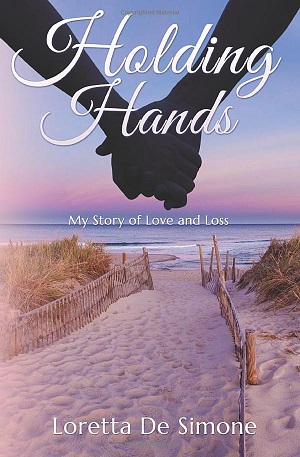Interview by Tiziano Thomas Dossena
 Loretta De Simone is a second-generation Italian strongly influenced by her Sicilian roots. Like many immigrant families, Loretta was raised in the 1960s in a two-family house in Queens, New York. Her maternal grandmother, who had immigrated from Catania, Sicily, in 1925 at the age of 25, lived in the apartment downstairs. Loretta spent many hours each day with her Nonna who told stories of her past and taught Loretta about Sicilian traditions.
Loretta De Simone is a second-generation Italian strongly influenced by her Sicilian roots. Like many immigrant families, Loretta was raised in the 1960s in a two-family house in Queens, New York. Her maternal grandmother, who had immigrated from Catania, Sicily, in 1925 at the age of 25, lived in the apartment downstairs. Loretta spent many hours each day with her Nonna who told stories of her past and taught Loretta about Sicilian traditions.
“Holding Hands: My Story of Love and Loss” is her first book.
L’Idea Magazine: As a second-generation Italian, how much did your roots influence your life?
Loretta De Simone: My father’s family immigrated from the Naples region, but we had no family ties to Italy on his side of the family. My Italian-Sicilian roots strongly influenced my life. I lived in a two-family house. My immediate family lived upstairs, and my maternal grandmother and aunt lived downstairs. My grandmother was 25 when she immigrated to the United States. As such she retained her Italian roots and assimilated to American ways.
The food we ate was mainly Italian and we always celebrated American holidays with a taste of Italy added. On Sundays, we ate a large meal in the afternoon and a smaller meal in the evening, Italian style. The family was around all the time. Cousins, aunts, and uncles came for large family holiday gatherings or for Sunday dinner and we would visit them as well. My extended family was a big influence on me. There was always someone to spend time with and learn from. I knew I was safe and cared for by more than just my immediate family.
The first-generation adults always spoke Italian or Sicilian.

L’Idea Magazine: You grew up in Queens in the 1960s. Do you find the city, and in particular Queens, has changed a lot since then?
Loretta De Simone: Yes. I grew up on a street where there were only two Italian families out of ten houses. The immediate area was predominantly German, that is second and third-generation German families. As I got older, the percentage changed to predominantly Italian. Out of the ten houses, six were Italian, three of which were first-generation Italian.
The children knew that every adult on that street was watching them. If you did something that was not acceptable, the adult would correct you and perhaps even tell your parents. This vigilance created a very safe environment and made us feel secure.
Summer evenings were spent sitting on the front porches. The adults would visit each other while the children played in the street. The ice cream truck arrived playing a jingle that called all the children.
The parish was the center of the neighborhood and provided education and social life for both the children and the adults.
I left the neighborhood over 35 years ago, and no longer have ties to it, but I drive past my home periodically, just to reminisce. The houses still look the same, but I suspect the demographic has changed. I also suspect the same tight-knit community feeling I grew up in no longer exists, but I do not know that for sure.

L’Idea Magazine: You had the fortune of having your grandmother living in the apartment downstairs in your Queens house. What did that offer to you as an experience, both emotionally and as a way of life?
Loretta De Simone: My mother worked as a teacher and my grandmother watched me when my mother or father were not at home. I spent many hours with her. She told me stories of her life in Italy and instilled in me a strong work ethic and encouraged me to be independent, adventurous, and self-sufficient. I was her companion when she visited her relatives. We traveled by bus and only Sicilian was spoken during these visits.
We played Italian card games, and she taught me to sew and crochet. I loved helping her make fresh ravioli and working in the garden to collect the tomatoes and vegetables.
When I was 10 years old my grandmother took me to Italy. We stayed for 6 weeks. During that time, I met many relatives and formed a bond with them that still exists today. I have traveled to visit them several times since and they have come to the United States. The next generation is continuing this connection as I too took my daughter to Italy at the age of 10 and she made connections to the cousins that were her age.
The biggest life lesson my grandmother taught me was caution. She told me to be friendly with everyone but not to trust them so quickly. I don’t know if this skepticism stemmed from the environment she grew up in (Sicily in the early 1900s) or a specific incident that took place.
My grandmother’s strength and independence became a way of life for me. She did not dwell on the past or experiences that might create hardship, she forged ahead working to reach her goal. She found a way to move forward, even during the most challenging of times. She relied on no one to help her through.

L’Idea Magazine: Your book “Holding Hands: My Story of Love and Loss” is about the loss of a partner, but also so much more. Could you talk about it for our readers?
Loretta De Simone: I was blessed to find my soul mate when I was 46. We spent 10 beautiful years together until he was diagnosed with pancreatic cancer, which changed our lives completely. During his illness, I searched for information on what to expect and how to deal with the situation but was not able to find anything helpful. I wrote the book hoping to help others who are going through a similar experience, navigate the challenges and understand the emotions that surface. The book tells the story of our chance meeting and the wonderful years we had together. It continues through his diagnosis and the 16 challenging months that followed. I focus on my emotional reactions and how I tried to overcome feelings of helplessness.
 L’Idea Magazine: I lecture about memoir writing and the necessity to leave our story and/or the story of the people close to us behind in a reachable form. It seems that you are on the same wavelength and found it necessary to do so. At what point in your life did you decide that you were ready to share your experience? Did you find any difficulty in talking about such an intimate part of your life?
L’Idea Magazine: I lecture about memoir writing and the necessity to leave our story and/or the story of the people close to us behind in a reachable form. It seems that you are on the same wavelength and found it necessary to do so. At what point in your life did you decide that you were ready to share your experience? Did you find any difficulty in talking about such an intimate part of your life?
Loretta De Simone: I actually wrote the book less than a year after Nick died. A stranger encouraged me to vent my emotions by writing. For 3 months I wrote every night and weekend, trying to capture the story and my emotions as clearly as possible. The process helped me grieve in a healthy way. I sat and wrote and cried through it all.
I put the book away and 5 years later, once I truly started to heal, I realized that others in my situation would benefit from my story. It was at that point that I self-published the book. The reactions I have received surprise me. Even people that have not had a similar experience were impressed with the story which reveals my courage, strength, love, and energy.
It was not difficult for me to share this intimate part of my life as I had nothing to be ashamed of. My feelings were strong and genuine, and I wanted to share this beautiful love story with everyone. Putting my thoughts and memories into words also keeps the story alive.
I have written about friends and family members after their deaths to capture their essence for future generations. The longest of these stories is about my grandmother, who was by far one of the most influential people in my life.
L’Idea Magazine: This is your first book. Most people find that opening to the possibility of writing their first book also opened their minds to many other writing possibilities. Do you think you may continue to write and publish books, or do you feel that writing this book was an essential need to fulfill and there is no need for you to write anymore?
Loretta De Simone: I did not expect the positive reactions I received from people about the book. I wrote it to vent my feelings of hurt, disappointment, frustration, and helplessness. But readers saw my courage and strength and applauded my ability to meet the challenges of the situation. Their reactions made me realize that people see situations differently.
Perhaps, one day, I may be inspired to write another story about a very emotional experience, should it arise. I do not believe I am able to write fiction, but I am able to capture life experiences in words.
L’Idea Magazine: How does it feel to be a published author? Do you enjoy giving presentations about your book and sharing your stories with a live audience?
Loretta De Simone: Being a published author makes me feel proud and I really enjoy giving presentations about my book. I appreciate their interest. The audience generally has many questions about writing it and the situations in the story. I enjoy the questions and their general interest in me.





